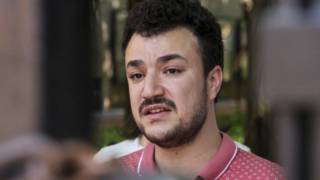HeadlinesNovember 09, 2023
U.N. Human Rights Chief Calls for Gaza Ceasefire, Citing “Living Nightmare”
Tens of thousands of Palestinians scrambled to flee northern Gaza on foot Wednesday after Israel’s military gave them a four-hour window to leave. Israeli officials say some 100,000 civilians remain in northern Gaza, down from more than a million a month ago. Human rights groups say many seniors, pregnant people, parents of young children and people with disabilities have been unable to heed Israel’s mass evacuation orders. This is Ahmed Mohammed, whose neighborhood near the al-Shati refugee camp came under intense Israeli bombardment.
Ahmed Mohammed: “May Allah protect us, because under these circumstances, anyone who wants to leave needs to have enough resources to be able to do that. Those without will have to stay where they are. It’s as if they’ve sentenced us to death.”
The U.N. agency for Palestinian refugees, UNRWA, says 70% of Gaza’s residents are displaced. Supermarkets have been swept clean of food and other essentials, and Israeli assaults have destroyed about a dozen of Gaza’s bakeries. With no clean drinking water, Palestinians have been forced to bathe in the Mediterranean Sea, where a total shutdown of Gaza’s wastewater treatment plants has forced the daily release of huge quantities of untreated sewage. The World Health Organization warned Wednesday of the spread of disease; it says since early October there’s been a sixteenfold increase in cases of diarrhea, most of them children under 5.
Gaza’s Health Ministry says one Palestinian child is being killed every 10 minutes, as 4,324 children have been confirmed killed in 33 days of relentless bombardment. Another 1,350 children are missing and presumed buried under the rubble. More than 10,500 Gazans have been killed.
On Wednesday, United Nations High Commissioner for Human Rights Volker Türk traveled to the Egyptian side of the Rafah border crossing to Gaza, where he demanded an immediate ceasefire and accused both Israel and Hamas of committing war crimes.
Volker Türk: “This is the gateway to a hellish nightmare. I cannot even fathom to think what people are going through on the other side. And then I see in front of me the lifeline that would bring — that would bring relief and humanitarian assistance, which until now has not been enough, woefully inadequate.”
Click here to see our interview with Volker Türk, as well as the head of the New York Office of the U.N. High Commissioner for Human Rights who resigned in protest over Israel’s assault on Gaza.
Palestinian Journalists Condemn Deadly Israeli Attacks on Colleagues
In the occupied West Bank, the Palestinian Health Ministry says an overnight Israeli military assault on the Jenin refugee camp has killed eight people and wounded at least 14 others. Elsewhere, Palestinian media workers took to the streets of Ramallah Tuesday to condemn the killing of their colleagues and demand Israel be held accountable by the International Criminal Court and the U.N. This is Nasser Abu Bakr, head of the Palestinian Journalists Syndicate.
Nasser Abu Bakr: “More than 60 media organizations were destroyed. Dozens of journalists’ families were killed. Dozens of houses that belonged to journalists were bombed. More than 22 broadcasting channels in the Gaza Strip stopped working completely. This is in addition to the greater crime, which is the killing of journalists themselves. More than 40 journalists and workers in media institutions were killed in Israeli bombardment.”
CIA Director Heads to Qatar, Where Talks Are Underway to Free Hostages Held by Hamas
CIA Director William Burns is in Qatar today, where indirect talks are underway aimed at a deal that would see Hamas release hostages in exchange for a three-day ceasefire in Gaza. The talks reportedly revolve around the release of 12 hostages, half of them U.S. citizens. Last month Qatar was reportedly closing in on a deal to release 50 hostages that fell apart when Israel launched its ground invasion of Gaza. Hamas has claimed more than 20 hostages have been killed by Israel’s bombardment. It’s believed Hamas took more than 240 people captive.
Israel Bans Antiwar Protests, Criminalizes “Consumption of Terrorist Materials”
Israel’s Supreme Court has banned antiwar protests, after residents of Arab-majority towns in northern Israel applied for permits to call publicly for a ceasefire. Israel’s High Court of Justice sided with police who said protests would divert critical resources.
On Wednesday, Israel’s Knesset amended its counterterrorism law, introducing a new criminal offense: the “consumption of terrorist materials.” Violators face up to one year’s imprisonment. Human rights groups have compared the amendment to “thought policing” and warn that even passively downloading material produced by Hamas could land people in prison.
300 Prominent Ukrainians Show Support to Palestinians; Belgian Leader Calls for Sanctions on Israel
More than 300 Ukrainian scholars, artists and activists have signed a letter expressing solidarity with Palestinians in Gaza. They write, “Palestinians have the right to self-determination and resistance against Israel’s occupation, just like Ukrainians have the right to resist Russian invasion.” The letter stands in contrast to the stance taken by Ukraine’s President Volodymyr Zelensky, who had been planning to go to Israel today to show support for Israel’s assault on Gaza, but canceled after news of his travel plans leaked.
In Belgium, Deputy Prime Minister Petra De Sutter called Wednesday for the European Union to immediately suspend its association agreement with Israel, and called on Belgium’s government to take meaningful action to stop the violence.
Deputy Prime Minister Petra De Sutter: “It is time for sanctions against Israel. The rain of bombs is inhumane. While war crimes are being committed in Gaza, Israel ignores the international demand for a ceasefire.”
In 2020, Petra De Sutter made history as the first transgender minister in Europe.
Activists, Congressional Staffers, USAID Employees Demand Gaza Ceasefire
Here in the United States, dozens of Jewish peace activists led a peaceful sit-in protest at the office of Earl Blumenauer Wednesday, calling on the Democratic congressmember to support a lasting ceasefire in Gaza. On Capitol Hill, more than 100 congressional staffers staged a walkout demanding their bosses back a ceasefire in Gaza. Also on Wednesday, over 1,000 employees of the U.S. Agency for International Development, USAID, signed a letter backing a ceasefire, adding, “humanitarian assistance efforts and life-saving aid are largely rendered moot in situations of escalating and indiscriminate bombing and violence.”
Thousands Flee Sudan’s Darfur Region Amid Spiraling Humanitarian Disaster
In Sudan, thousands have been forced to flee West Darfur as the Rapid Support Forces militia makes major advances in the region, seizing cities from the Sudanese army. CNN reports the RSF is killing and torturing various ethnic groups. Fighting between the country’s military and the RSF broke out on April 15 in Khartoum and has since spread. At least 10,000 civilians have been killed, and many more injured. The U.N. says 4.5 million have been internally displaced, while over 1.2 million have fled Sudan, many of them crossing into Chad.
Asiya: “They told me that my brother was killed, and we do not know where he is. I, my mother and my sister’s children came to Chad. We don’t know where my father is. We couldn’t find him. They burned everything and took everything. We did not bring anything with us — only God and our clothes.”
The U.N. warns the conflict could soon engulf South Sudan and the disputed Abyei region.
Sudan’s health system is “stretched to breaking point” as four out of five health facilities have stopped functioning in some areas. Cholera, measles, dengue and malaria are quickly spreading, as is malnutrition. The warring parties met for talks in Saudi Arabia this week, where they agreed to help facilitate humanitarian aid access, but did not agree to a ceasefire.
2023 Will Be the Hottest Year on Record
The European Union’s climate monitoring agency says 2023 is on track to be the hottest year in at least 125,000 years. October shattered the previous record for the month, set in 2019, with surface temperatures soaring to 0.85 degrees Celsius above historical averages. On Wednesday, a new United Nations report found that the world’s top fossil fuel producers still plan to produce more than double the amount of fossil fuels in 2030 than what would be consistent with limiting global heating to 1.5 degrees Celsius.
Torrential Rains, Flooding in Somalia Kill Dozens After Years of Drought
In Somalia, historic rainfall and flooding has killed at least 29 people and displaced over 300,000. The flooding has also destroyed vital livestock and farmland. This is a displaced person describing the scene at one of the camps that has been set up to house fleeing residents.
Fadumo Abdulkadir: “It is raining on us for the fifth day. Lying in the rain killed two elderly women. Our makeshift shelters were washed away. Children are missing now. We do not know whether they are dead or alive. We request the aid agencies to urgently help us. This rain is a disaster.”
The downpours come after a protracted drought in the Horn of Africa that killed an estimated 43,000 people in Somalia last year. The climate crisis is increasing unpredictable cycles of extreme weather.
Fire at Houston-Area Chemical Plant Prompts Evacuations, Shelter-in-Place Orders
In Texas, an explosion at a chemical plant in San Jacinto County triggered a massive fire, sending plumes of black smoke into the sky. Authorities ordered a nearby school to evacuate and others in the vicinity to shelter in place. The Houston-area plant belongs to Sound Resource Solutions, a maker of solvents for glue and paint remover. The chemicals processed at the plant are highly toxic and have been linked to cancer, among other serious health issues. Texas Democratic state Senator Roland Gutierrez said, “Unfortunately, chemical explosions are commonplace in Texas. For decades, politicians like Ted Cruz have rolled back environmental protections and safety standards. Now, our families, workers, and communities are left to deal with the fallout.”
Front-Runner Donald Trump Boycotts as 2024 Republican Hopefuls Hold Third Debate
Five candidates vying for the Republican Party’s 2024 presidential nomination squared off in Miami, Florida, Wednesday evening for their third debate. In one of the evening’s most heated exchanges, South Carolina Senator Tim Scott pressed former South Carolina Governor Nikki Haley to commit to support a federal ban on abortions after 15 weeks. Haley countered that she would “support anything that would pass” Congress. Once again, Republican front-runner Donald Trump skipped the debate in Miami. Instead, Trump hosted a rally nearby in South Florida, where he mocked other candidates, praised Hungarian Prime Minister Viktor Orbán as the “leader of Turkey” and confused North Korean leader Kim Jong-un with Chinese leader Xi Jinping.
Donald Trump: “Kim Jong-un leads 1.4 billion people, and there’s no doubt about who the boss is. And they want me to say he’s not an intelligent man.”
Trump also said Hungary borders on Russia and Ukraine — which it doesn’t. We’ll have more on last night’s Republican debate later in the broadcast.
Meanwhile, the Minnesota Supreme Court has rejected a bid to block Trump from the state’s Republican primary ballot next year. There are similar efforts underway in Colorado and Michigan to bar Trump from running under the “insurrection” provision of the 14th Amendment.
SAG-AFTRA Reaches Deal with Hollywood Studios to End Actors’ 118-Day Strike
SAG-AFTRA and Hollywood studios have reached a tentative agreement, ending the record-breaking 118-day strike. The deal includes an increase in minimum wages of 7%, a “streaming participation bonus,” higher pension and health contributions, and protections against artificial intelligence. This is Los Angeles SAG-AFTRA member Emily Kincaid, who highlighted the sacrifices made by union members to reach the historic agreement.
Emily Kincaid: “We have a lot of our strike captains on the line that have been close to eviction and have had their only meal of the day be while they’re striking. So it has not been easy. But we all have come together for a singular purpose, and we’ve all helped each other. And we knew we wanted to keep going until we got the deal that we deserved.”
Bangladeshi Garment Worker Killed by Police as Protests Continue to Demand Fair Wages
In Bangladesh, clashes between protesting garment workers and police led to the death of at least one worker Wednesday, while several others were wounded. Workers in the garment manufacturing hub of Gazipur, on the outskirts of the capital Dhaka, have been protesting for weeks to demand livable wages. On Tuesday, authorities announced an increase in the monthly minimum wage to $113, up from $75. But workers, who are asking for a minimum of $208 a month, rejected the offer. This is Rahima Begum.
Rahima Begum: “Have you seen the price of potatoes and onions in the market? The new hike will not compensate for the deficit of our needs. It should be raised further. We have to pay rent, food and children’s education. The market economy is on fire. How can we go on like this?”
Bangladesh has some 3,500 factories employing about 4 million garment workers, most of them women. They make clothing for fast fashion brands in the U.S. and Europe, including H&M and GAP, and sell to major chains like Walmart.
Most popular
- 1
- 2
- 3
- 4
Non-commercial news needs your support
Please do your part today.











Media Options